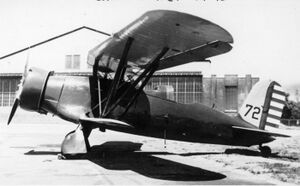Engineering:Curtiss O-40 Raven
| O-40 Raven | |
|---|---|

| |
| The original prototype YO-40 | |
| Role | Observation aircraft |
| National origin | United States of America |
| Manufacturer | Curtiss-Wright |
| First flight | 1932 |
| Introduction | 1933 |
| Retired | 1939 |
| Primary user | United States Army Air Corps |
| Number built | 5 |
The Curtiss O-40 Raven was an United States of America observation aircraft of the 1930s which was built and used in small numbers. A single example of the YO-40, a single-engined Sesquiplane with a retractable undercarriage was built, followed by four examples of a modified monoplane version, the O-40B, which remained in use until 1939.
Development and design
In 1931, in response to a United States Army Air Corps requirement for a new observation aircraft, Curtiss designed the Model 62, a single-engined biplane with the lower wing much smaller than the upper, known as a sesquiplane (i.e. "one-and-a-half wings"), while the outer panels of the upper wings were swept back to avoid centre-of-gravity problems. It was of all-metal construction, with a monocoque fuselage and had a retractable tailwheel undercarriage with inwards retracting mainwheels, and was powered by a Wright Cyclone radial engine. The crew of two sat in tandem in open cockpits.[1][2][3]
A prototype, designated YO-40, flew in February 1932. Although it crashed in May that year, it was rebuilt with stronger wings and an enclosed cockpit as the YO-40A. A further four YO-40As were ordered, but they were redesigned as monoplanes by removing the lower wing, the resultant aircraft being designated Y1O-40B.[2][4]
Operational history
The four Y1O-40Bs were delivered in June 1933, and after service tests, were redesignated O-40B,[5] being operated by the 1st Observation Squadron of the USAAC.[6] While the aircraft's performance and manoeuvrability were good, the Air Corps was disappointed with the cockpit arrangements and the low fuel capacity,[2] and no more orders followed. The last O-40B was withdrawn from use in 1939.[5]
Variants
- YO-40
- Prototype powered by 653 hp (487 kW) Wright R-1820E Cyclone engine.[7]
- YO-40A
- YO-40 rebuilt with stronger wings and enclosed cockpit. Scrapped 1938.[2][5]
- Y1O-40B
- Monoplane derivative with lower wing removed. Powered by 670 hp (500 kW) R-1820-27. Four built.[5]
- O-40B
- Redesignation of Y1O-40B.[5]
Operators
 United States
United States
- United States Army Air Corps
- 1st Observation Squadron
Specifications (O-40B)
Data from Curtiss Aircraft 1907–1947[5]
General characteristics
- Crew: two
- Length: 28 ft 10 in (8.79 m)
- Wingspan: 41 ft 8 in (12.70 m)
- Height: 10 ft 8 in (3.25 m)
- Wing area: 266 sq ft (24.7 m2)
- Empty weight: 3,754 lb (1,703 kg)
- Gross weight: 5,180 lb (2,350 kg)
- Powerplant: 1 × Wright R-1820-27 Cyclone 9-cylinder air-cooled radial engine, 670 hp (500 kW)
Performance
- Maximum speed: 187.7 mph (302.1 km/h, 163.1 kn)
- Cruise speed: 160.5 mph (258.3 km/h, 139.5 kn)
- Stall speed: 62 mph (100 km/h, 54 kn)
- Range: 324 mi (521 km, 282 nmi)
- Service ceiling: 23,100 ft (7,000 m)
- Rate of climb: 1,660 ft/min (8.4 m/s)
Armament
- Guns: 1× fixed forward firing .30 in machine gun and 1× .30 in machine gun in observers cockpit
References
- Notes
- ↑ Bowers 1979, pp. 331–332.
- ↑ 2.0 2.1 2.2 2.3 "Curtiss:K through Z". aerofiles. 24 January 2009. Retrieved 10 March 2010.
- ↑ Flight 4 January 1934, p.20.
- ↑ Bowers 1979, pp. 332–333.
- ↑ 5.0 5.1 5.2 5.3 5.4 5.5 Bowers 1979, p.333.
- ↑ "Factsheets : 1 Reconnaissance Squadron (ACC) ". Air Force Historical Research Agency, United States Air Force. Retrieved 10 March 2010.
- ↑ Bowers 1979, p.332.
- Bibliography
- Bowers, Peter M. Curtiss Aircraft 1907-1947. London:Putnam, 1979. ISBN:0-370-10029-8.
- "A Modern American Observation Aircraft:The Curtiss "Raven" (Wright "Cyclone F") developed for the U.S. Army Air Corps". Flight, 4 January 1934, p. 20.
External links
 |

